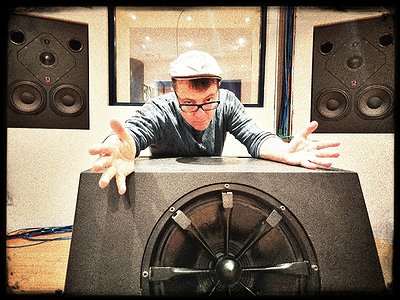Name: Robert Osterberger
Nationality: Austrian
Occupation: Producer
Current release: @ Repulse "Reggae Classics", the latest album by Dubblestandart (and a collaboration with Dennis Bovell ) is out via Echo Beach.
Gear recommendations: Try an analog mixing desk. Not only for sound, but for the haptic hands-on experience!
The last Software that really impressed me was SplitEQ by Eventide.
If you enjoyed this interview with Robert Osterberger and would like to know more about his work, you can either visit the website of his Go East Studios in Vienna or the official Doublestandart homepage.
What was your first studio like?
A musty room in the basement of a squatted house.
We had a Yamaha MT44 4-Track but one track was used to sync up to a Commodore 64 which ran an 8 Track MIDI sequencer!
We even had another C-64 running a mono sampler with unbelievable 2.1 seconds of sampling time!
How and for what reasons has your set-up evolved over the years and what are currently some of the most important pieces of gear for you?
I tend to keep gear I regularly use and let go of stuff that I seem to ignore for some time. Well at least I try to let it go.
Most of my Moogerfooger pedals are very characteristic and important to me. Also, my vintage 224 Lexicon for its crunchy converters and unreal spatial image and my AKG BX15 Spring Reverb which sounds absolutely NOT like a spring reverb. More like a plate. It will probably never leave my studio.
And then there are the old synths … and the tube stuff, which I found cannot be done digitally. Little failures and old capacitors or slight distortions / saturations will give you a distinct and characteristic, hopefully unique sound when used in the right combinations.
Some see instruments and equipment as far less important than actual creativity, others feel they go hand in hand. What's your take on that?
For me creativity lies very much within while using the gear. But I must admit that a good song is a good song is a good song. So, there you go.
A studio can be as minimal as a laptop with headphones and as expansive as a multi-room recording facility. Which studio situation do you personally prefer – and why?
I own a medium size multi-room studio and love to work with musicians who will preferably all be playing together.
Take that away and I will take the laptop and headphones, sure.
From traditional keyboards to microtonal ones, from re-configured instruments (like drums or guitars) to customised devices, what are your preferred controllers and interfaces? What role does the tactile element play in your production process?
I need faders, knobs and keyboards. I do own a little modular system, but I am not using my own designed controllers. Interesting but not interesting enough for me.
In the light of picking your tools, how would you describe your views on topics like originality and innovation versus perfection and timelessness in music? Are you interested in a “music of the future” or “continuing a tradition”?
I am always for originality, if that includes imperfection so be it.
To copy something from the past has its challenges but will most likely not stand the test of time and it gets boring to recreate, too. Combine the old with the new I say!
Most would regard recording tools like microphones and mixing desks as different in kind from instruments like keyboards, guitars, drums and samplers. Where do you stand on this?
Both need skills, experience and creativity.
Within a digital working environment, it is possible to compile huge archives of ideas for later use. Tell me a bit about your strategies of building such an archive and how you put these ideas and sketches to use.
I started building an archive years ago, gave it up years ago. Maybe some AI Database app will help me to organize it better soon?
How do you retain an element of surprise for your own work – are there technologies which are particularly useful in this regard?
Working analog helps, because you will make mistakes or errors at some point and that might just be element of surprise the track needed.
Hopefully you recorded it! (laughs)
Production tools can already suggest compositional ideas on their own. How much of your music is based on concepts and ideas you had before entering the studio, how much of it is triggered by equipment, software and apps?
This is very much changing and depends on the project.
It’s very often the new synth or fx box but might also be a picture or sound in the head you want to get out.
Have there been technologies which have profoundly changed or even questioned the way you make music?
Ableton Live made it so much easier to perform on stage.
And being able to tune monophonic and even polyphonic sources in the studio is a curse and a blessing at the same time. It must be witchcraft, I am sure! (laughs)
To some, the advent of AI and 'intelligent' composing tools offers potential for machines to contribute to the creative process. Do you feel as though technology can develop a form of creativity itself? Is there possibly a sense of co-authorship between yourself and your tools?
If humans are not becoming obsolete in the process, I find it interesting.
AI does already some crazy stuff in editing though, which is mind blowing.
What tools/instruments do you feel could have a deeper impact on creativity but need to still be invented or developed?
Good question!




